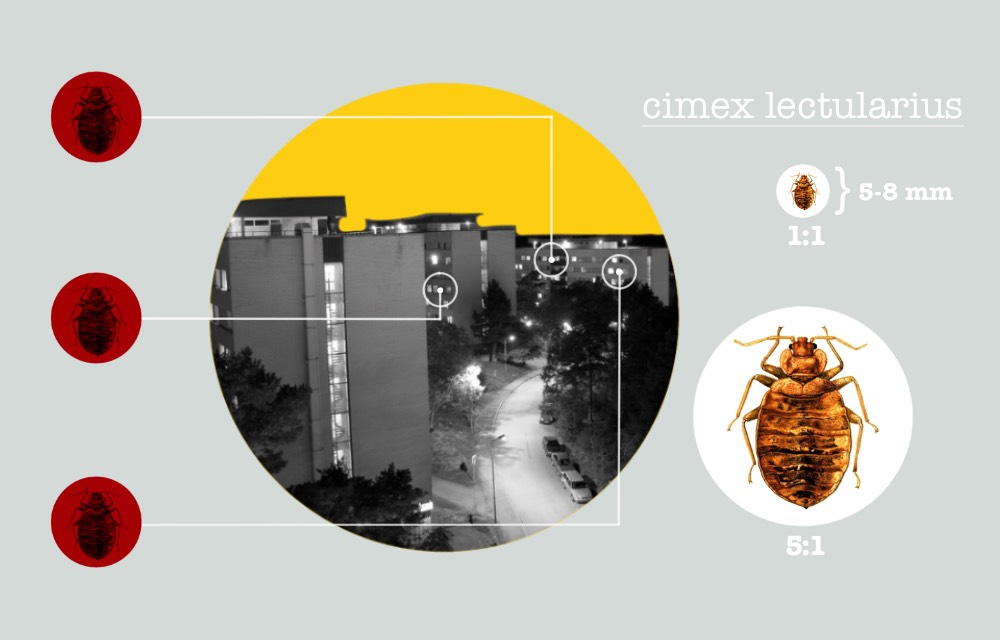
What’s bugging Flogsta?
– The past year was an absolute hell actually, having to deal with the bugs and the pandemic on top of that, says one of the students Ergo has been in contact with.
The landlord and Housing Office, on their end, stress the importance of reporting any pest issues to them as soon as possible.
The stories from the tenants and former tenants all begin in a similar fashion; it’s either tiny specks of blood on their sheets or an itch on their body. Or both. When trying to locate the source of the discomfort they discover the tiny bugs, crawling on and under their beds and sometimes walls.
"My boyfriend, who had the keys to my room, called me one day and told me that he had discovered an infestation of bed bugs under my mattress. That there were thousands of them."
For former Flogsta tenant “Elin” it was the itch. She got back from a foreign exchange in March of last year and moved into a furnished corridor room in one of the high rises. She says she noticed right away the room hadn’t been properly cleaned.
– I called Heimstaden [the landlord who owns the Flogsta high rises] and they told me that since the room had passed the inspection they couldn’t do anything about it.
In April she got rashes all over her body. As her skin is sensitive, she thought her soap and skincare products might be the culprits, but after replacing all of them and the rashes remained she contacted a doctor.
– He looked at my skin and said “there is nothing I can do about this. It’s not rashes, it’s bite marks from bed bugs.” I had not had any issues with bed bugs while I was on my exchange, so they must have already been there when I moved into the room.
Elin’s boyfriend, who lived in the same corridor, noticed the bugs on Elin’s wall.
– I went and stayed with my parents for a while. My boyfriend, who had the keys to my room, called me one day and told me that he had discovered an infestation of bed bugs under my mattress. That there were thousands of them.
She contacted Heimstaden who told her they would pay for the needed treatment, but that Elin would have to contact Anticimex, the pest control company, herself. When she did, they told her she would have to wait six week for the treatment and that she was not allowed to move to a new room during that time since she would risk spreading the pests.
– It felt absolutely terrible having to live there while waiting for them to come. And when they had done the treatment they said I couldn’t move for a month, or I might bring the bugs with me.
However, as Elin finished her last semester at the university in the spring 2020, her lease for the room was up before the one month she had been told to stay there had come to an end.
– It felt horrible having to leave the room before it was safe to do so with regards to the bugs, but I had no choice. I have no idea if the person who moved in there after me had to deal with the bugs as well. The other people in my corridor were afraid of getting the bugs too.
Elin and her boyfriend moved to an apartment together and unfortunately the bed bugs came with them. Again they had to contact Anticimex to get rid of the bugs. They moved again in the beginning of 2021 and for the first time in almost a year, Elin’s life was bed bug free.
– The past year was an absolute hell actually, having to deal with the bugs and the pandemic on top of that. It affected me both physically and mentally, as well as my relationship. I still have physical scars from the bugs.

International student “Andrew” rented his Flogsta room through Uppsala University Housing Office, an organization that provides housing to certain categories of international students, and his experience with bed bugs began in November last year. The itching started almost as soon as he had moved in at the beginning of the semester, but as he had never had any issues with bed bugs up until then he didn’t have any reason to believe the pests might be to blame until he spotted one of them in November. He contacted Heimstaden and got the same response as Elin – contact Anticimex.
– I reached out to Anticimex, but the person concerned couldn’t be bothered, claiming they only spoke Swedish, and they hung up on me. I then decided to handle the situation on my own and washed all my clothes at the highest possible temperature, including the bedsheets, mopped the floor and vacuumed the apartment for possible eggs and other bugs.
In January he spotted the bugs again and wrote another lengthy email to Heimstaden, explaining the situation and got the exact same response he got the first time – contact Anticimex. As he had little luck the first time, Andrew got a friend to help him fill out a form on the company’s website. He finally scheduled an appointment with Anticimex and after the treatment, he was told he had to stay in the room for two months and continue to sleep in the infected bed. Andrew then contacted Uppsala University Housing Office asking to change rooms and pointed out to them that the bugs could easily spread to his neighbours as there is an uninsulated hole for the ethernet cable in the wall to the next room.
The Housing Office told Andrew they couldn’t provide him with another room as he would only bring the bugs with him, and to stay put and follow the instructions given by Anticimex. Andrew, however, got an offer for new housing and decided to terminate the contract for his Flogsta room and asked to be exempt from the three month notice period to compensate for his difficulties. In the end, the Housing Office offered to deduct one month from the notice period, provided Andrew signed an agreement where he took full responsibility for taking all necessary steps to reduce the risk of spreading the bugs.
– Housing office only allowed me to leave a month earlier, but still I have not got the deposit back so I'm not yet sure if I really didn't pay for that month too, he informs us in May.
He has now moved to another place, but says that living with the bed bugs damaged his sleep quality, ruined some of his clothes due to the high washing temperatures, and left bite marks on his skin. He wishes that the communication between Heimstaden and the Housing Office would improve on this matter and that the Housing Office should be more considerate of those who have a bug infestation.
Several other tenants and former tenants of Flogsta high rises, most of them international, have reached out to Ergo telling us how the bed bugs have affected their quality of life. One of them got a new room with the discovery of the bugs, while others had to coexist with the bugs for a few months. Some of them, like Elin and Andrew, point out that they wish the landlords would have been more considerate of their situation and offered them some sort of compensation for having to live with the bugs and sometimes ruining their clothes, bed sheets and other fabrics as they have had to wash them on such high temperatures.
– I have been paying the whole rent price every month without receiving appropriate services from the landlords. I never expected this kind of carelessness in Sweden, says one of them.

Heimstaden, the company that owns the Flogsta high rises, answers our questions via email. Ann-Katrin Olsson, the company’s regional manager, says it’s in their greatest interest to have Anticimex get to the infected rooms as soon as possible to eliminate the bed bugs and to prevent them from spreading to other rooms.
– That’s why it’s so important that the tenants report any pest-related issues they might have and most of them do understand how critical this is. When we experience difficulties in exterminating the bed bugs, the reason is usually a tardy report from the tenant. But we always get rid of the bugs eventually!
"Usually it’s the tenants themselves who bring the bed bugs with them when they move in."
They don’t keep track of the exact number of bed bug cases they have had in the high rises this past year, as not all tenants contact them before turning to Anticimex, but estimate that they have been informed of around ten of them. Ann-Katrin Olsson says that they do a general check up for bugs and other pests as they inspect the rooms when a tenant moves out, but that they can be very hard to detect when the room has been cleaned. The question of compensation or rent deduction is an issue that needs to be discussed with the tenant affected by the pests.
– We have to assess each case individually to determine whether they might get compensated or not. Usually it’s the tenants themselves who bring the bed bugs with them when they move in, says Ann-Katrin Olsson.
The tenants are obligated to inform the landlord of a potential bed bug infestation as soon as possible, and to follow the instructions given by the pest control company, in this case Anticimex. According to Ann-Katrin Olsson, Heimstaden try not to have tenants move before the bed bugs have been completely exterminated, but if you have to move before the treatment is completely finished, it’s extra important that you follow the advice given by Anticimex.
– The bed bugs like to stay as close to the bed as possible and they don’t like to move more than necessary, so spreading tends to happen when someone is visiting or sleeps over in the room. That’s when you are at risk of contracting the bugs, but normally they stay in the infected room, says Ann-Katrin Olsson.

Uppsala University Housing Office, the organization that provides housing to certain categories of international students, echo Heimstaden’s advice, imploring their tenants to report any pest issues to them, the landlord or pest control company as soon as possible. The Housing Office rents around 2 000 student accommodations throughout Uppsala (many of them in Flogsta) and sublets them to, primarily, international students.
Ann Klaar, who is the Housing Office’s head of office, says that they get a few reports of bed bugs each year, but that no area seems to be more affected than others.
– We haven’t experienced any bigger issues with bed bugs, but there are a few reports each year. We have a good routine for handling this though, says Ann Klaar.
As soon as they get word of any bed bugs or other pest issues they give the students information on which pest control agency to contact (they vary depending on which area the student lives in).
– We keep a dialogue with each affected student to try to find the best possible solution to minimize the risk of spreading and to get rid of the bugs as soon as possible, says Ann Klaar.
"Normally we ask that the students contact pest control themselves, but if they are struggling with this, of course we will help them."
Just as Heimstaden, the Housing Office doesn’t have a general policy on monetary compensation or rent reduction when a tenant informs them of a bed bug infestation. In general though, they want the tenants to stay put in their rooms or apartments until the extermination procedure is complete to avoid spreading the bugs, rather than offering them new accommodation.
– In Sweden, the treatments offered need to reach a certain level of eco-friendliness, which is why you need to wait for a few weeks after the treatment to make sure all the bugs are dead. During that time it’s important to follow the instructions given by the pest control company and you can also borrow bed covers from your landlord if you wish.
If you’re new in Uppsala, young and can’t speak Swedish, it might be difficult to contact the pest control company and having to deal with a bed bug situation on your own, is it not possible for you to help them out?
– Normally we ask that the students contact pest control themselves, but if they are struggling with this, of course we will help them. They just need to reach out to us and ask for assistance, says Ann Klaar.
Tiny vampires
Bed bugs, or “cimex lectularius” in Latin, is a small insect between five and eight millimeters long. Their prevalence in Sweden has increased with the global mobility and often get into our rooms, flats and houses through luggage after a visit abroad or via second hand furniture.
These tiny vampires usually spend their daytime in mattress creases and other furniture and come out at night to seek out their hosts, often a human, and feed on their blood. Though the bite of a bed bug isn’t painful, some people develop an allergic reaction to the saliva they inject when they bite, which may cause itching, redness and slight swelling. A bed bug infestation isn’t dangerous per se and doesn’t, on its own, damage your property (other than potential specks of blood), but they may pain the afflicted mentally and physically.
How to identify them
Bed bugs are roughly the size and shape of an apple seed and are yellow/brownish or brown/reddish depending on if they have eaten or not. If you find small specks of blood or dropping on your sheets, you may have bed bugs. You can also find living bugs and remains of their shredded skin in creases in or around your bed.
How to deal with them
It’s important to know that it’s the property owner’s responsibility to make sure that a bed bug infestation is properly dealt with as soon as possible. They need to have routines for dealing with bed bugs and usually have a contract with a pest control company that deals with the extermination.
It’s nearly impossible to deal with a bed bug infestation on your own, which is why you need to contact your landlord as soon as you suspect you might have bed bugs. You need to follow their instructions to properly get rid of the bugs and to prevent potential spreading.
How to prevent them
– Always check creases and undersides of second hand furniture before bringing them into your home.
– Don’t leave your suitcase open on the floor of hotel rooms when you are traveling.
– Unpack your suitcase in a well lit room when you get back from travelling. Don’t unpack on your bed and try to wash your clothes immediately on as high a temperature as the garment will allow.
– Put any garments you might suspect of being infested in a plastic bag and freeze them for a week.
Source: anticimex.com and the Public Health Agency of Sweden

























